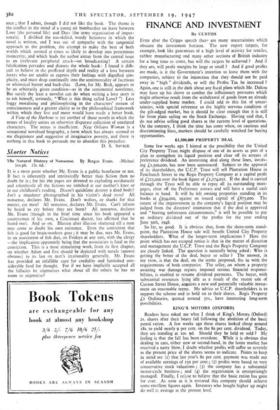FINANCE AND INVESTMENT
By CUSTOS
EVEN after the Cripps speech there are many uncertainties which obscure the investment horizon. The new export targets, for example, look like guarantees of a high level of activity for textiles, rubber manufacturing and many other sections of British industry for a long time to come, but will the targets be achieved ? And if they are, will profit margins be large or small ? And if good profits are made, is it the Government's intention to leave them with the companies, subject t6 the injunction that they should not be paid away in " high " dividgnds, or will the Profits Tax be increased ? Again, one is still in the dark about any fiscal plans which Mr. Dalton may have up his sleeve to combat the inflationary pressures which might otherwise result from the withdrawal of goods from an already under-supplied home market. I could add to this list of uncer- tainties, with special reference to the highly nervous condition of the gilt-edged market, but it should be clear enough that it is still far from plain sailing on the Stock Exchange. Having said that, I do not advise selling good shares at the current level of quotations. On the contrary, I think the time has come when, on cautious and discriminating lines,,niarkets should be carefully watched for buying opportunities.
£1,500,000 PROPERTY DEAL
Some few weeks ago I hinted at the possibility that the United City Property Trust might dispose of one of its assets as part of a plan to strengthen its liquid position and clear off its arrears of preference dividend. An interesting deal along these lines, involv- ing £1,5oo,000, has now been announced. Subject to the approval of its shareholders, the U.C.P. Trust will sell Plantation House in Fenchurch Street to the Regis Property Company at a capital profit of £225,000 over the book figure of £1,274,052. If the deal is carried through the Trust will be able to repay all its outstanding mort- gages, clear off the Preference arrears and will have a useful cash balance in hand. It will be left owning properties standing in its books at £934,000, against an issued capital of £675,000. The extent of the improvement in the company's liquid position may be judged from the directors' intimation that if the deal is approved and "barring unforeseen circumstances," it will be possible to pay an ordinary dividend out of the profits for the year ending
June 30th, 1948. .
So far, so good. It is obvious that, from the short-term stand- point, the Plantation House sale will benefit United City Property shareholders. What of the longer-term implications ? Here the point which has not escaped notice is that in the matter of direction and management the U.C.P. Trust and the Regis Property Company are closely linked. The question is naturally being asked: Who is getting the better of the deal, buyer or seller ? The answer, in my view, is that the deal, on the terms proposed, fits in with the requirements of both companies. The seller, on whom a property awaiting war damage repairs imposed serious financial responsi- bilities, is enabled to resume dividend payments. The buyer, with substantial resources lying idle as a result of the recent sale of Curzon Street House, acquires a new and potentially valuable invest- ment on reasonable terms. My advice to U.C.P. shareholders is to support the scheme and to hold on to their shares. Regis Property LI Ordinaries, quoted around .5rs., have interesting long-term possibilities.
KING'S MOTORS (OXFORD)
Readers have asked me what I think of King's Motors (Oxford) 2S. shares after their heavy fall following the abolition of the basic petrol ration. A few weeks ago these shares looked cheap around 18s. to yield nearly 9 per cent. on the 8o per cent. dividend. Today, they are standing at los. 9d. Should they be held or sold ? My feeling is that the fall has been overdone. While it is obvious that dealing in cars, either new or second-hand, in the home market has received a nasty blow, I doubt whether profits will suffer so severely as the present price Of the shares seems to indicate. Points to keep in mind are (I) that last year's 8o per cent, payment was made out of available earnings of 15o per cent.; (2) profits were based on very conservative stock valuations ; (3) the company has a substantial motor-cycle business ; and (4) the organisation is enterprisingly managed. Finally, I refuse to believe that the basic ration has gone for ever. As soon as it is restored this company should achieve some excellent figures again. Investors who bought higher up might do well to average at the present level


































 Previous page
Previous page